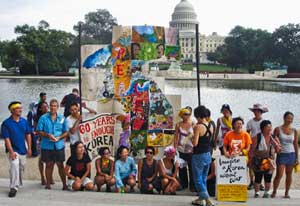Koreans in U.S. call for peace treaty
Published Aug 6, 2010 10:03 AM
Two Korean groups in the United States — the pro-reunification,
community-based, grassroots organization Nodutdol and the National Campaign to
End the Korean War — held a joint cultural event in Washington, D.C., on
July 25 to call for a peace treaty between the U.S. and the Democratic
People’s Republic of Korea, often referred to by the U.S. media as north
Korea.
This action comes 60 years after the start of the devastating Korean War, a war
that is actually still not over, since the open hostilities ended in an
armistice, not a peace treaty.
On the same day that this interactive art installation, called “100
Bojagis for Peace,” took place, U.S. imperialism and its puppets in south
Korea began provocative war “games” to threaten socialist north
Korea. Called “Invincible Spirit” by the imperialist military, the
exercises are the largest ever conducted by the U.S. military. The Voice of
America, speaking for the government, called them “unprecedented in
scope.”
In contrast to U.S. militarism, the focus of the art installation was bojagis,
patchwork bags traditionally used by rural poor people as backpacks in which
they carry their belongings. They are closely associated with the experience of
refugees during the war who were fleeing the U.S. bombing of their villages and
towns. Several of the bojagis had MP3 players showing interviews with former
refugees and U.S. soldiers speaking about their experiences during the war.
Members of Nodutdol also put on a Pungmul band performance. Pungmul is a drum
band that has its roots in the collective-labor farming culture of poor
peasants in Korea. It was also used as a form of social protest during the
years of Japanese colonial occupation.
Later that evening, a program of spoken word performances and a film about
Korean adoptees, “In the Case of Cha Jung-hee,” was shown at the
Justice Center. Organizations that helped make this powerful national action a
success included DMZ-Hawaii, Ubuntu Works, Korean-American National
Coordinating Council, Korea Policy Institute, the International Action Center,
Vets for Peace and the ANSWER Coalition.
Articles copyright 1995-2012 Workers World.
Verbatim copying and distribution of this entire article is permitted in any medium without royalty provided this notice is preserved.
Workers World, 55 W. 17 St., NY, NY 10011
Email:
[email protected]
Subscribe
[email protected]
Support independent news
DONATE

